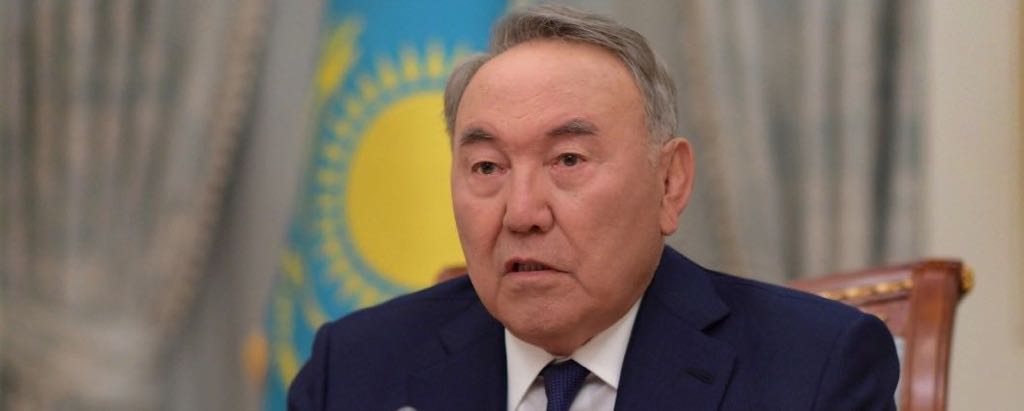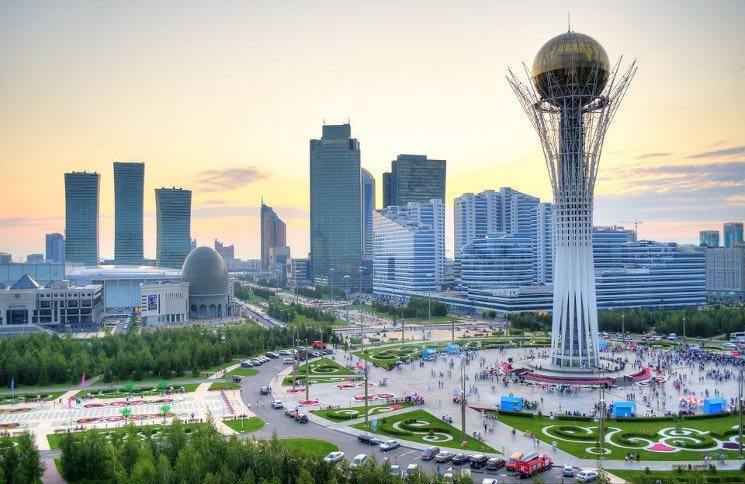Less than a day after president Nursultan Nazarbayev announced that he would step down after 30 years in power Kazakh parliament decided to rename capital Astana to Nursultan. And wants to make the president's daughter speaker of the House. So is he really stepping down? asks our columnist Mark Galeotti. And: what can Vladimir Putin learn from the cunning fox about exit strategies and safe havens?
 Nursultan Nazarbayev on March 19 announced his coming resignation (picture Presidential Site of Kazakhstan)
Nursultan Nazarbayev on March 19 announced his coming resignation (picture Presidential Site of Kazakhstan)
The veteran leader, who for some time looked as if he was looking for a way out, steps down. Or is it sideways? Or is it up? In any case, he exchanges the tedious minutiae of day-to-day governance for a position which combines security, prestige, and the scope to intervene in politics when he wants, ignore it when he can. This may well be Vladimir Putin's dream scenario, but Kazakhstan's Nursultan Nazarbayev has beaten him to it.
The Kazakh ascension
On 19 March, Nazarbayev announced that he would be standing down as president. After years of speculation about his succession, the actual news came as a surprise, but on closer examination, two things became clear. First of all, this was not a spur of the moment decision; and secondly, that Nazarbayev was not so much surrendering power as discarding the more tiresome aspects of it.
Carnegie Moscow scholar Alexander Gabuyev is probably right to suggest that the real genesis of this gambit was inspired by unfolding events in Uzbekistan after the death of (almost) equally long-lived dictator Islam Karimov in September 2016. A vicious tyrant, he failed properly to plan for succession. After his death, the maybe-reformist Shavkat Mirziyoyev took power, and soon Karimov was becoming a non-person, while his family disappeared from view, languished in detention, or sought asylum abroad.
In Gabuyev's words, 'the lesson for Nazarbayev was: if you want to keep your loved ones free, alive and wealthy, dying in office isn't an option'. Besides, the situation in Kazakhstan is different, not least as the presence of ethnic Russians in the north gives Moscow a vestigial pretext for interference if succession was botched or looked as it was heading in a direction with which the Kremlin could not live. There is no sense, at the moment at least, that Russia is at all interested in some kind of direct adventurism in Kazakhstan, but if the country looked as if it might descend into chaos, then this would pose a danger the Kremlin could not ignore. Kazakhstan's stability and security matter to many, after all.
So Nazarbayev had been preparing the ground. He needed to ensure his strong personal control over the security apparatus and also the support, or at least compliance of the national elite. By appointing former prime minister Karim Masimov to head the KNB, the Committee of National Security, he got both. Masimov has already demonstrated to the Kazakh elite that resistance was futile.
Secondly, he needed a successor. For the moment, Senate chair Kasym-zhomart Tokayev becomes interim president. Tokayev, a career diplomat with a particular expertise on China, is both a trusted proxy but also someone whose skill set is quite appropriate to handle the transitional period, not least given that both Beijing and Moscow will be very interested in the outcome. Besides, the apparent intent is that he will remain interim until the scheduled elections in 2020. That gives some time for him to prove to the Kazakh elite that he is not a threat, and to show Nazarbayev that he is a worthy – and safe – successor.
After all, Tokayev lacks his predecessor’s public authority and powerful network of allies and clients within the system. It would likely not be difficult for Nazarbayev to topple him, were that necessary, and he much know this full well himself. Indeed, there are other potential candidates in the wings such as Samat Abish, Nazarbayev’s great nephew, and possibly an ally of Masimov’s. (Abish formerly served as deputy head of the KNB.)
Thirdly, Nazarbayev needed to create a political position for himself as, in effect, father of the nation, one not susceptible to term limits or other constraints. As far back as 2010, parliament voted (unanimously, of course) to declare him elbasi, or ‘Leader of the Nation’, for life. In 2017, he began moving some powers from the presidency to the government, and then in 2018, the role of the Security Council was strengthened, and with it its chair, a position that Nazarbayev is retaining as it has also been made – for him – a lifelong appointment. Combine that with his position heading the ruling Nur Otan (‘Radiant Fatherland’) party, and Nazarbayev has a power base that is both strong enough to satisfy him and diversified enough not easily to be challenged.
Kazakhising Russian politics?
Of course, Russia is not Kazakhstan, and Nazarbayev is not Putin. Nonetheless, the issues of succession and transition are central topics for discussion both behind the beyond the Kremlin walls, and what is unfolding in Astana (which may be renamed Nursultan in a classic piece of symbolic homage) is strikingly similar to the kind of scenario being discussed in Russia.
 Astana, since 1997 Kazakhstan's new capital in the desert, has been renamed four times. Now it will be Nursultan.
Astana, since 1997 Kazakhstan's new capital in the desert, has been renamed four times. Now it will be Nursultan.
The goal appears – appears – to be for Putin to find some way of, like Nazarbayev, ascending to this mystical position of power without responsibility either when his present term expires in 2024, or maybe even before, if the stars are right. It is not so much that he appears to fear mortality, so much as simply that he is tired, even bored, with much of the job of the presidency. He is far less engaged with most policy areas now, with the exclusion of foreign policy and the distribution of major government contracts. His relationship with the Russian people is becoming attenuated: he travels around the country less, and while his response to recent downturns in public support has been a slew of promises to improve their quality of life, it is questionable how far he intends or expects to deliver. The glory days of the 2000s, when the problems seemed easy, the international context amenable, and the money plentiful, must seem distant now.
For Putin, creating a suitable constitutional structure, a secular stardom, will be relatively easy
If one looks at the three pillars of Nazarbayev’s strategy, the first – control over the security apparatus – appears not even in question. Most of the key figures are personal beholden to Putin, and share his broad worldview. They are also held in a careful balance of mutual competition and suspicion, which means that if one breaks ranks, there are carnivorous rivals ready to bring them back into line. Indeed, in hindsight this may help explain why Putin has several times backed away from the idea – strongly supported by the Federal Security Service (FSB) – to recreate a single KGB-like super-agency. While this would have given him more control while president, it risked making him less secure in a post-presidential existence.
What about a successor? This is, arguably, the trickiest issue, especially as Russia, unlike Kazakhstan, does not have strong and relatively stable kin-based networks on which Putin could rely. The current top echelon of Russian leaders are probably not figures on whom he feels he could rely. They lack the stature, or perhaps more importantly are too potentially powerful. If his non-Russian heritage could be ignored, for example, Sergei Shoigu might make a popular and potent president, but this is a problem rather than a plus for Putin as he would be unlikely to be dependent on his successor, or receptive to his guidance. In many ways, Dmitri Medvedev’s presidency was something of an extended job interview, one Putin decided he had failed. That decision might be haunting him now, and it may be that Medvedev – more as a consensus-brokering chair than a bare-chested autocrat – will come back into the running.
However, it is more likely that any successor will either be a more junior figure such as minister for economic development Maxim Oreshkin or deputy prime minister Dmitry Kozak. Rather more likely is it that it is someone whose name we do not yet know, possibly one of the new generation being groomed through the ‘Leaders of Russia’ contest. Putin will likely ideally want someone who is at once loyal yet forceful, capable yet unlikely to outshine his patron, able to build coalitions in Moscow yet still dependent. That is quite an ask. And then perhaps hardest of all, Putin will have to put his faith in this figure and step away from the limelight.
Secular stardom
If he does, though, creating a suitable constitutional structure, a secular stardom, will be relatively easy. The Security Council is less appropriate as a formal basis for this position – the State Council may work better as it is at present both impressive-sounding and yet reassuringly ambiguous. It would be much easier to turn this into the kind of body needed, and make its chair a much more powerful position. Beyond that, it would be straightforward to pass whatever other legislation or constitutional amendments as may be needed to secure Putin’s independence, prosperity and political influence.
Ironically, loyalists and critics alike would support this, the former because they want to see Putin retain a role in the system, the latter because it is the only way to diminish that role. Unlike Nazarbayev, Putin would not be likely to place much weight on a party affiliation, though. His United Russia bloc has already become sufficiently toxic that already the Kremlin is distancing itself from it, and he would probably instead cultivate an image as above party squabbles.
Prospects
So Nazarbayev is blazing a trail that Putin may choose to follow, itself drawing on the examples of Lee Kwan Yew in Singapore (who stepped down as prime minister to become senior minister and then minister-mentor to his own son, current prime minister Lee Hsien Loong) and China’s Deng Xiaoping (who remained the key architect of national policy, even after he has relinquished the chairs of the Central Advisory Commission and Central Military Commission). The aims are not entirely the same: the ailing Kazakh is likely more interested in posthumous security for his kin than the seemingly still-vigorous Russian. Likewise, the political contexts are not wholly comparable.
On the whole, though, this does seem to be an experiment that the Kremlin will watch with considerable interest. If the transition is smooth, then the pressure on Putin to ascend to some new position, at once greater in stature and less mired in day-to-day governance, will only grow. Options such as amending the constitution to allow him to serve another term, or even more problematic moves involving uniting with Belarus – something in truth no one seems to want – will become even less appealing. And so, a (virtual) star may be born.
